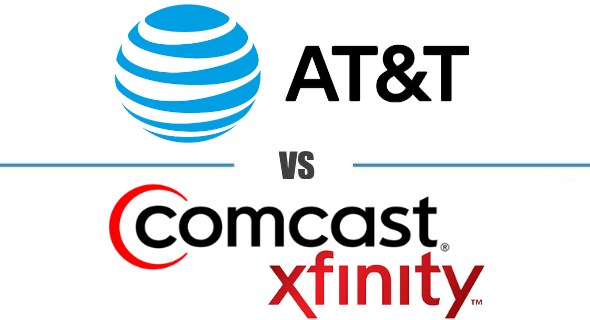While Spectrum offers a solid balance of speed and affordability, competitors like Xfinity provide a slightly lower starting price, albeit with lower starting speeds. On the other hand, AT&T’s fiber plans, though pricier, offer much higher top speeds for customers who need the ultimate in internet performance.
30 October, 2024 | Posted by: Pablo Mendoza
Category: Reviews | No Comments

In an effort to retain more customers and attract new ones, Spectrum recently launched new, cheaper internet plans while increasing speeds across several of its bundles. These changes are aimed at competing with other major broadband providers like Xfinity and AT&T.
According to Reuters, Spectrum's new offerings will help customers benefit from faster speeds at a lower cost. But how does Spectrum fare when compared to other top internet service providers? Let’s take a closer look.
Spectrum’s updated plans feature upgraded speeds while offering competitive pricing. The standout features of these new plans include:
These improvements make Spectrum a strong contender, especially when compared to fiber and 5G internet providers. But how does it perform in a head-to-head comparison with competitors like Xfinity and AT&T?
We’ve analyzed Spectrum’s plans against its competitors in terms of speed, pricing, and value. Here's how it compares to Xfinity and AT&T, two of the largest ISPs in the country.
| Provider | Starting Speed (Mbps) | Starting Price (Per Month) | Top Speed Available |
|---|---|---|---|
| Spectrum | 300 Mbps | $49.99 | 1 Gbps |
| Xfinity | 200 Mbps | $39.99 | 1.2 Gbps |
| AT&T | 300 Mbps | $55.00 | 5 Gbps |
While Spectrum offers a solid balance of speed and affordability, competitors like Xfinity provide a slightly lower starting price, albeit with lower starting speeds. On the other hand, AT&T’s fiber plans, though pricier, offer much higher top speeds for customers who need the ultimate in internet performance.
If you’re in the market for a new internet provider, consider the following:
Ready to upgrade your internet? Check out these current offers:
Ultimately, the best internet provider for you depends on your location, budget, and internet needs. Spectrum’s new affordable plans offer great value for most households, but if you’re after the fastest speeds available, AT&T’s fiber plans might be worth the extra cost. To see more options and compare providers, visit our internet provider comparison page.
When choosing an internet service provider (ISP), it's crucial to compare the offerings of AT&T and Comcast to determine which is better for your needs. This blog will provide an in-depth comparison, covering key aspects like speed, pricing, coverage, customer service, and additional features.
15 November, 2024 | Posted by: Pablo Mendoza
Category: Reviews, Internet, Service Providers | No Comments

When choosing an internet service provider (ISP), it's crucial to compare the offerings of AT&T and Comcast to determine which is better for your needs. This blog will provide an in-depth comparison, covering key aspects like speed, pricing, coverage, customer service, and additional features.
| Feature | AT&T | Comcast (Xfinity) |
|---|---|---|
| Speed | Up to 5 Gbps (fiber) | Up to 2 Gbps (fiber) |
| Pricing | Starts at $35/month | Starts at $29.99/month |
| Coverage | Extensive, growing fiber | Nationwide, strong presence |
| Customer Service | Generally positive | Mixed reviews |
| Additional Features | Smart Home Manager, Wi-Fi hotspots | xFi app, on-demand options |
Choosing between AT&T and Comcast depends on your specific needs. AT&T offers higher fiber speeds and better customer service, while Comcast provides extensive coverage and competitive pricing. Consider your priorities, such as speed, budget, and customer service, to make the best decision.
The digital age is upon us, and with it comes the need for faster, more reliable internet. Enter 5G home internet, a technology that promises to revolutionize our online experiences.
15 November, 2024 | Posted by: Pablo Mendoza
Category: Reviews | No Comments

The digital age is upon us, and with it comes the need for faster, more reliable internet. Enter 5G home internet, a technology that promises to revolutionize our online experiences. But with several providers offering 5G home internet services, how do you choose the best one for your needs? In this article, we'll delve into a comprehensive comparison of two leading providers: AT&T and T-Mobile. We'll explore their 5G home internet services, comparing key features, pricing, installation processes, and more. Our goal is to provide you with the information you need to make an informed decision. Whether you're a tech enthusiast, a work-from-home professional, or a family in need of high-speed internet, this comparison will guide you in choosing the right 5G home internet service. So, let's dive in and explore the world of 5G home internet with AT&T and T-Mobile.
Before we delve into the comparison, let's first understand what 5G home internet is. 5G, or fifth-generation technology, is the latest iteration of cellular technology, engineered to increase the speed and responsiveness of wireless networks. With 5G, data transmitted over wireless broadband connections could travel at rates as high as 20 Gbps. That's not just faster than 4G; it's around 100 times faster. But how does this technology translate into home internet use? Let's explore this further.
5G internet is a new kind of network designed to connect virtually everyone and everything together, including machines, objects, and devices. This network is meant to deliver higher multi-Gbps peak data speeds, ultra-low latency, more reliability, massive network capacity, increased availability, and a more uniform user experience.
5G home internet works by receiving 5G signals from a nearby cell tower and converting them into Wi-Fi signals for home use. This means you can connect all your devices to the internet without needing a cable running to your house. It's a wireless alternative to cable, DSL, and fiber internet.
5G home internet and fiber internet are both high-speed internet options, but they work differently. While 5G is wireless, fiber internet is wired, meaning it requires physical cables to connect your home to the network. Fiber internet is known for its speed and reliability, but 5G internet aims to compete with its promise of high-speed wireless connectivity.
AT&T is one of the leading providers of 5G home internet in the United States. They offer a wireless home internet solution that leverages their 5G network. This service is designed to provide high-speed internet access to homes, especially in areas where traditional broadband services may not be available or reliable. AT&T's 5G home internet service is part of their broader effort to expand and improve their 5G network coverage.
AT&T's 5G home internet service offers several key features and benefits. Firstly, it provides high-speed internet access with speeds that can compete with traditional broadband services. This makes it a viable option for streaming, gaming, working from home, and other high-bandwidth activities. Secondly, because it's wireless, it can be a good option for homes in areas where wired internet services are not available or reliable. Finally, AT&T's 5G home internet service is designed to be easy to set up and use, with customer support available to help with any issues.
AT&T offers its 5G home internet service at competitive prices. The exact cost can vary depending on your location and the specific plan you choose. It's worth noting that AT&T often offers promotional pricing for new customers, so it's a good idea to check their website or contact them directly for the most up-to-date information.
Setting up AT&T's 5G home internet service is designed to be straightforward. They provide a gateway device that you connect to your devices via Wi-Fi. This device receives the 5G signal from AT&T's network and converts it into a Wi-Fi signal for your home. AT&T provides instructions for setting up the device, and customer support is available if you need help.
T-Mobile is another major player in the 5G home internet market. They offer a wireless home internet service that uses their 5G network to deliver high-speed internet access to homes. T-Mobile's 5G home internet service is part of their larger strategy to leverage their 5G network to provide a range of services to customers. This includes not only home internet but also mobile internet and other connected services.
T-Mobile's 5G home internet service offers several key features and benefits. Firstly, it provides high-speed internet access, with speeds that can compete with traditional broadband services. This makes it a good option for streaming, gaming, working from home, and other high-bandwidth activities. Secondly, T-Mobile's 5G home internet service is wireless, making it a viable option for homes in areas where wired internet services are not available or reliable. Finally, T-Mobile's 5G home internet service is designed to be easy to set up and use, with customer support available to help with any issues.
T-Mobile offers its 5G home internet service at competitive prices. The exact cost can vary depending on your location and the specific plan you choose. Like AT&T, T-Mobile often offers promotional pricing for new customers, so it's a good idea to check their website or contact them directly for the most up-to-date information.
Setting up T-Mobile's 5G home internet service is designed to be straightforward. They provide a gateway device that you connect to your devices via Wi-Fi. This device receives the 5G signal from T-Mobile's network and converts it into a Wi-Fi signal for your home. T-Mobile provides instructions for setting up the device, and customer support is available if you need help.
When it comes to 5G home internet, speed and performance are key factors. Both AT&T and T-Mobile claim to offer high-speed internet access via their 5G networks. However, the actual speeds you can achieve will depend on several factors, including your location, the specific plan you choose, and the time of day.
Independent speed tests have shown that both AT&T and T-Mobile can deliver impressive speeds with their 5G home internet services. However, the results can vary widely depending on the specific circumstances. In some tests, AT&T's 5G home internet service has outperformed T-Mobile's. In others, T-Mobile has come out on top.
In addition to speed, network reliability and coverage are also important considerations. Both AT&T and T-Mobile have been investing heavily in their 5G networks to improve coverage and reliability. AT&T has a long history in the telecommunications industry and has a wide network coverage. T-Mobile, on the other hand, has been rapidly expanding its 5G network and now covers many urban and suburban areas.
Customer service is a crucial aspect of any internet service provider. It's important to know that you can rely on your provider to resolve any issues quickly and efficiently.
AT &T has a dedicated customer service team for its 5G home internet customers. Customers have reported that the team is generally responsive and helpful.
T-Mobile also has a strong reputation for customer service. Their customer support team is known for being friendly and proactive in resolving issues.
When choosing a 5G home internet provider, there are other factors to consider beyond speed, price, and customer service. These include data caps, contract requirements, and security features.
AT&T's 5G home internet plans come with unlimited data, which is a major advantage for heavy internet users. On the other hand, T-Mobile also offers unlimited data, but it's important to read the fine print for any potential restrictions or throttling policies.
Both AT&T and T-Mobile have robust security measures in place to protect your data. However, it's always a good idea to research and understand the privacy policies of any internet service provider before making a decision.
Choosing between AT&T and T-Mobile for your 5G home internet service is not a one-size-fits-all decision. It depends on your specific needs, location, and personal preferences. Both providers offer competitive plans, but the best choice for you will depend on your unique circumstances.
AT&T's 5G home internet service stands out for its unlimited data and robust security features. However, T-Mobile's 5G home internet service is also a strong contender, with competitive pricing and a reputation for reliable customer service.
In the end, the best way to make your decision is to consider your specific needs, do your research, and choose the provider that best aligns with your requirements and expectations.
Explore more about internet providers and related blogs on Konecteaze.
Choosing the right internet service is crucial for ensuring a reliable and satisfactory online experience.
14 November, 2024 | Posted by: Pablo Mendoza
Category: Reviews | No Comments

Choosing the right internet service is crucial for ensuring a reliable and satisfactory online experience. Here are ten essential questions to ask before making a decision:
Different areas have access to various types of internet services, such as DSL, cable, fiber optic, satellite, and fixed wireless. It's important to know what options are available to determine the best fit for your needs. Check coverage maps and use tools like Konecteaze to find out which providers and services are accessible in your location.
Internet speed is a critical factor in determining how quickly you can download or upload content. Ask about both download and upload speeds, as they can vary significantly between providers and plans. For a comparison of speeds, refer to resources like Speedtest.
Some internet plans come with data caps, which limit the amount of data you can use each month. Exceeding this limit can result in additional charges or reduced speeds. Make sure to ask if there are any data caps and what the consequences are if you exceed them.
Understanding the full cost of the service is essential. Ask about the monthly rate, installation fees, equipment rental fees, and any other potential charges. Inquire about promotional rates and how long they last, as well as the regular rate after the promotion ends.
Some internet providers require long-term contracts, while others offer month-to-month plans. Ask if a contract is required, the length of the contract, and the penalties for early termination.
Find out what equipment is necessary for the service, such as modems, routers, or gateway devices. Ask if the equipment is included in the cost, if there are rental fees, or if you have the option to purchase your own equipment.
Reliable customer service and technical support are crucial for resolving any issues that may arise. Research customer reviews and ask the provider about their support hours, response times, and the methods available for contacting support (e.g., phone, chat, email).
Some internet plans come with additional features, such as security suites, email accounts, or access to Wi-Fi hotspots. Ask about any extra benefits included with the service and how they can enhance your internet experience.
Inquire about the installation process, including whether professional installation is required or if self-installation is an option. Ask about the associated costs and the estimated time frame for getting the service up and running.
Service reliability is crucial for a seamless internet experience. Ask about the provider's uptime guarantee, any known issues with service interruptions, and how they handle maintenance and outages.
For more detailed information and to explore different internet service options, visit Konecteaze, where you can compare plans, read reviews, and find the best internet service providers in your area.
For frequent travelers like RVers, campers, and digital nomads, staying connected on the road has always been a challenge. T-Mobile's new "Away" plan aims to solve this problem by providing a reliable and robust internet solution that leverages the power of its extensive 5G and 4G networks.
23 October, 2024 | Posted by: Pablo Mendoza
Category: Reviews | No Comments

For frequent travelers like RVers, campers, and digital nomads, staying connected on the road has always been a challenge. T-Mobile's new "Away" plan aims to solve this problem by providing a reliable and robust internet solution that leverages the power of its extensive 5G and 4G networks. Let's explore how this plan is designed to keep travelers connected, its features, and how it stacks up against the competition.
The Away plan offers an unlimited data option for $160 per month with AutoPay. This is particularly beneficial for travelers who need consistent and high-volume internet access for work or entertainment on the go.
For those who don't need unlimited data, there is a 200GB plan available for $110 per month with AutoPay. This offers a more affordable option while still providing substantial data for most uses.
The plan includes a 5G gateway device at no extra cost. This device can connect up to 64 devices simultaneously, making it ideal for families or groups traveling together. It also features the latest security protocols like WPA3 to ensure safe and secure internet access.
T-Mobile's network covers two million square miles, more than AT&T and Verizon combined, ensuring that travelers can stay connected almost anywhere in the United States.
With the price lock feature, customers can lock in their monthly rate and enjoy peace of mind knowing that their rate won't increase unexpectedly. If T-Mobile raises the rate, customers are eligible to get their last month of service refunded, with certain exclusions like taxes and fees applying.
T-Mobile's Away plan is positioned to compete directly with other mobile internet solutions, including those from AT&T and Verizon, and even satellite internet services like Starlink. Here's how it compares:
Despite its benefits, there are some challenges and considerations to keep in mind:
T-Mobile's Away plan offers a compelling solution for travelers seeking reliable and extensive internet connectivity on the road. With its robust features, wide coverage, and multiple data options, it caters to the needs of RVers, campers, and digital nomads. However, the cost and certain limitations should be considered before making a decision.
For more details on T-Mobile's plans and how they compare to other providers, visit Konecteaze.com.